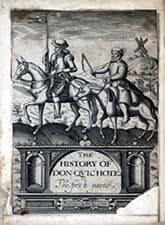Don Quixote
 First English edition frontispiece, 1620
First English edition frontispiece, 1620Original title
El ingenioso hidalgo Don Quijote de la Mancha
Also known as
The Ingenious Gentleman Don Quixote of La Mancha, or The History of Don Quixote, or The Adventures of Don Quixote of la Mancha
First publication
1605–1615
Literature form
Novel
Genre
Literary
Writing language
Country
Author's country
Spain
Length
Approx. 395,000 words
Notable lines
Idle reader, you can believe without any oath of mine that I would wish this book, as the child of my brain, to be the most beautiful, the liveliest and the cleverest imaginable. But I have been unable to transgress the order of nature, by which like gives birth to like.
— First lines, "Prologue", trans. J.M. Cohen
In a certain village in La Mancha, which I do not wish to name, there lived not long ago a gentleman—one of those who have always a lance in the rack, an ancient shield, a lean hack and a greyhound for coursing.
— First lines, "Chapter 1", trans. J.M. Cohen
Books which are printed by royal licence and with the approval of those to whom they are submitted, and which are read with universal delight and applause by great and small, poor and rich, learned and ignorant, plebeians and gentlefolk—in short, by all kinds of persons of every quality and condition—could they be lies and at the same time appear so much like the truth?
Can we ever have too much of a good thing?
Fear is sharp-sighted, and can see things under ground, and much more in the skies.
To withdraw is not to run away, and to stay is no wise action when there is more reason to fear than to hope. 'Tis the part of a wise man to keep himself today for tomorrow, and not venture all his eggs in one basket.
The world as nothing he did prize,
For as a scarecrow in men's eyes
He lived, and was their bugbear too;
And had the luck, with much ado,
To live a fool, and yet die wise.
Every man is as Heaven made him, and sometimes a great deal worse.
Love and War are the same thing, and stratagems and policy are as allowable in the one as in the other.
The pot calls the kettle black.
For my sole object has been to arouse men's contempt for all fabulous and absurd stories of knight errantry, whose credit this tale of my genuine Don Quixote has already shaken, and which will, without a doubt, soon tumble to the ground. Farewell.
— Last lines, trans. J.M. Cohen

